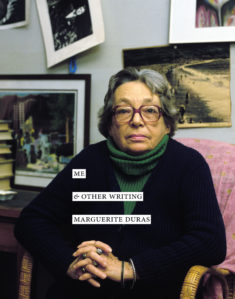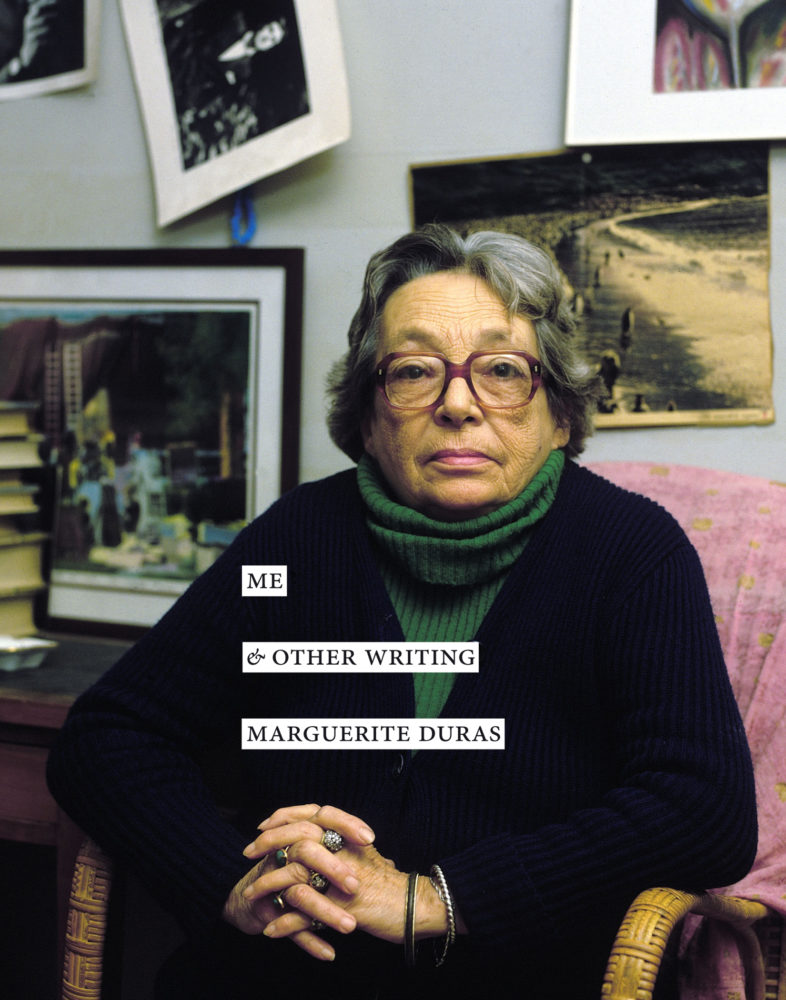
buy this book from our distributor NYRB
Marguerite Duras was one of France’s most important and prolific writers. Born Marguerite Donnadieu in 1914 in what was then French Indochina, she went to Paris in 1931 to study at the Sorbonne. During WWII she was active in the Resistance, and in 1945 she joined the Communist Party. Duras wrote many novels, plays, films, and essays during her lifetime. She is perhaps best known for her internationally bestselling novel The Lover, which won the Prix Goncourt in 1984. She died in Paris in 1996.
Olivia Baes is a trilingual Franco-American writer and actress. She holds a Bachelor’s Degree in Comparative Literature and a Master of the Arts in Cultural Translation from the American University of Paris.
Emma Ramadan is a literary translator based in Providence, RI, where she co-owns Riffraff, a bookstore and bar. She is the recipient of an NEA fellowship, a PEN/Heim grant, and a Fulbright for her translation work. Her translations include Anne Garréta’s Sphinx and Not One Day, Virginie Despentes’s Pretty Things, Ahmed Bouanani’s The Shutters, and Marcus Malte’s The Boy.
Dan Gunn is a novelist, critic, and translator, as well as being one of the editors of the four-volume Letters of Samuel Beckett and editor of the Cahiers Series. He is Distinguished Professor of Comparative Literature & English at the American University of Paris where he directs the Center for Writers & Translators. He was designated in 2017 as editor of Muriel Spark’s letters.
Me & Other Writing

buy this book from our distributor NYRB
“A luminous, erudite exploration of self and art.”
—Kirkus
Introduction by Dan Gunn
For news and events, please follow us on Instagram or sign up for our newsletter.
A new collection of Duras’s essays, translated into English for the first time.
In her nonfiction as well as her fiction, Marguerite Duras’s curiosity was endless, her intellect voracious. Within a single essay she might roam from Flaubert to the “scattering of desire” to the Holocaust; within the body of her essays overall, style is always evolving, subject matter shifting, as her mind pushes beyond the obvious toward ever-original ground.
Me & Other Writing is a guidebook to the extraordinary breadth of Duras’s nonfiction. From the stunning one-page “Me” to the sprawling 70-page “Summer 80,” there is not a piece in this collection that can be easily categorized. These are essayistic works written for their times but too virtuosic to be relegated to history, works of commentary or recollection or reportage that are also, unmistakably, works of art.
Read an excerpt from the book (“The Horror of Such a Love”) at The New Yorker. Watch the video of our Celebration of Marguerite Duras event at The Center for Fiction, with Kate Zambreno and co-translator Emma Ramadan.
*
TABLE OF CONTENTS
Introduction vii
Publisher’s Note xvii
Flaubert Is . . . 1
The Sound and the Silence 13
My Mother Had . . . 19
Atlantic Black 30
Letter to Centre Rachi 35
Translation 37
I Thought Often . . . 39
Horror at Choisy-le-Roi 48
Nadine from Orange 57
Reading on the Train 67
True Appearances 78
The Men of Tomorrow 82
The Right, Our Death 88
The Horror of Such a Love 90
Me 93
Summer 80 95
Notes & Context 173
Translators’ Afterword 181
Biographical Notes 187
*
“This little book of goodies starts off with a bang. . . . And the brief translators’ Afterword to this collection is a piece of writing on its own, a tender précis on the art, and dilemmas, of rendering Duras and her ‘écriture courant’ in English.” —Rachel Kushner, Artforum
“Of course many of us have read L’Amant, and many of us are already fans of the kind of autofiction that Duras helped popularize, but despite that I was unprepared for how deeply affecting a reading experience Me & Other Writing would be. Duras is not for an age, as they say, but for all time, and the pieces collected lovingly and thoughtfully into this volume will stay with me forever.” —Kyle Williams, Chicago Review of Books
“The work in Me & Other Writing varies from essays to journalism to the beginnings of the autofiction she would make famous with L’Amant, for which she won the Prix Goncourt in 1992, but they are completely alike in their didacticism, humor, pessimism, and intelligence. Her voice is so strong that she dissolves boundaries to create a single oeuvre, a composite but unified body of work.” —Natasha Boyd, Los Angeles Review of Books
“Baes and Ramadan capture the liberty and madness, the very breath of Duras’s thought: moving seamlessly between ideas, the measured precise inhales and exhales of an opera singer. They make distant events, foreign ideas, and even repulsive thoughts belong to the reader herself. . . . Reading Me & Other Writing is a powerful experience: I’ve been compelled to tell people about it and to share her ideas and nearly aphoristic paragraphs with my own writing students.” —Allison Grimaldi-Donahue, Words Without Borders
“This is writing that demands, and provides, its own spotlight—not only through its incandescent intelligence (as in Duras’s reading of the violence enacted not by, but upon, Simone Deschamps in “Horror at Choisy-le-Roi”), but also through its refusal of linear exposition, the way it careens from one idea to another or dashes the reader’s expectation of authorly pronouncements by offering instead a lyrical image (Olivia Baes and Emma Ramadan reflect on the challenges of translating this opacity in an excellent note in the book’s final pages).” —Heather Cleary, Book Marks
“This volume of work is summoned from a lifetime of believing in the wealth of the world as material—that love will never be satiated, that insanity will always rear from amongst the ordinary, that the sea will never empty.” —Xiao Yue Shan, 3:AM Magazine
“Duras’s writings span a host of styles and emotional tones, but Anglophone readers have, to date, not been exposed to nearly as much of her nonfiction. That’s all about to change with this expansive collection of her nonfiction, offering readers a way to engage with a new, and equally impressive, side of Duras’s bibliography.” —Vol. 1 Brooklyn
“As Duras tells us about the Moscow Olympics, shipyard strikes in Gdańsk, her hopes for a proletarian revolution, and her despair at the ‘misfortune of mankind,’ she weaves in a tender narrative about a small boy and the adolescent girl who looks after him. This is entirely fictional—a characteristic ploy from a writer who believed that understanding suffering was an act of the imagination.” —The New Yorker
“Me & Other Writing is both a wonderful, accessible introduction to Duras and a collage-like collection offering aficionados a fresh view at a writer who escaped genre constraints and offered literature a new realm of possibilities.” —Joy Clark, Arkansas International
“In these essays, in all of Duras’s works, seduction runs through the language, fluid and elastic, teasing and testing. For Duras, the writing is indistinguishable from the erotic.” —Julia Bosson, BOMB Magazine
“While reading Marguerite Duras, it can be hard to tell if you are pressing your hands to her chest or if she is pressing her hands to yours. Has she mined your deepest feelings or have you caught her heart’s fever? Her nonfiction, written in the same blood and seawater as her fiction, produces the same sensation.” —Julia Berick, Paris Review “Staff Picks”
“Dorothy, a publishing project’s new collection of Duras’s work, Me & Other Writing, encompasses pieces of varying lengths and subjects, from brief thoughts on translation, to shrewd articles on politics and political figures, to the strange and profound essay ‘Summer 80,’ which defies description.” —Katie da Cunha Lewin, Los Angeles Review of Books
“In order to let go, you must have something you’ve been holding onto—a body of knowledge collected over time, from reading and observing. Otherwise, spontaneous writing runs the risk of shallow breadth. Duras read avidly, amassing references and influences, which may be why her dashed-off reflections aren’t broad and shallow, but assured and direct, and moving in their directness. As she put it, ‘it’s when intelligence is at the pinnacle of its power that it goes quiet. And that’s when the writing flows.’” —Maddie Crum, “Marguerite Duras: Internet Essayist,” Literary Hub
“A celebrated essayist, director, and author of fiction, Duras also frequented the hinterlands of experimental journalism, writing pieces for newspapers and magazines from Libération to Vogue that combine the jagged incongruities of imagery and texture characteristic of her stream-of-consciousness style with her equally unmistakable linguistic facility that tips more often than not into the poetic. Until now, however, most of Duras’s journalistic writing has been unavailable to readers of English. Me & Other Writing brings this facet of Duras to light. In doing so, the volume manages to offer an accessible primer to her work in general as well as a careful assessment of what it is like to attempt to render Duras’s prose into English.” —Cory Austin Knudson, Full Stop
Marguerite Duras was one of France’s most important and prolific writers. Born Marguerite Donnadieu in 1914 in what was then French Indochina, she went to Paris in 1931 to study at the Sorbonne. During WWII she was active in the Resistance, and in 1945 she joined the Communist Party. Duras wrote many novels, plays, films, and essays during her lifetime. She is perhaps best known for her internationally bestselling novel The Lover, which won the Prix Goncourt in 1984. She died in Paris in 1996.
Olivia Baes is a trilingual Franco-American writer and actress. She holds a Bachelor’s Degree in Comparative Literature and a Master of the Arts in Cultural Translation from the American University of Paris.
Emma Ramadan is a literary translator based in Providence, RI, where she co-owns Riffraff, a bookstore and bar. She is the recipient of an NEA fellowship, a PEN/Heim grant, and a Fulbright for her translation work. Her translations include Anne Garréta’s Sphinx and Not One Day, Virginie Despentes’s Pretty Things, Ahmed Bouanani’s The Shutters, and Marcus Malte’s The Boy.
Dan Gunn is a novelist, critic, and translator, as well as being one of the editors of the four-volume Letters of Samuel Beckett and editor of the Cahiers Series. He is Distinguished Professor of Comparative Literature & English at the American University of Paris where he directs the Center for Writers & Translators. He was designated in 2017 as editor of Muriel Spark’s letters.
Marguerite Duras In France In October, 1984. By Louis Monier.
Louis Monier / Gamma-Rapho / Getty Images

